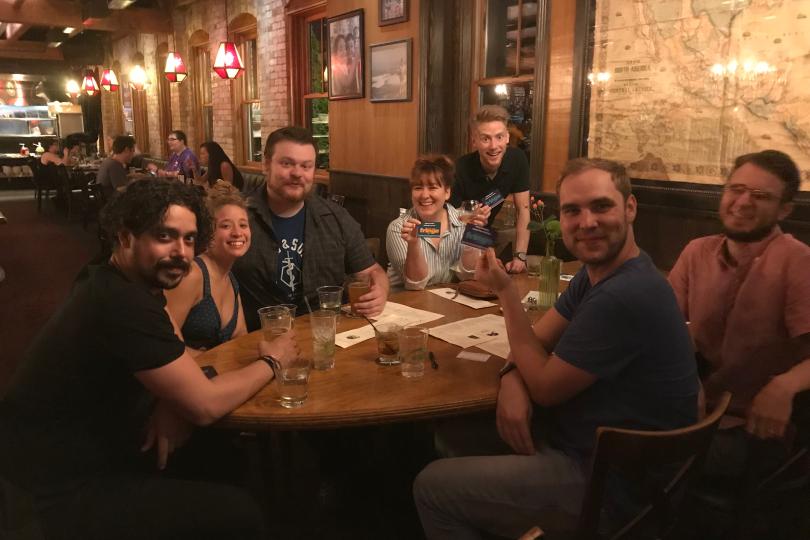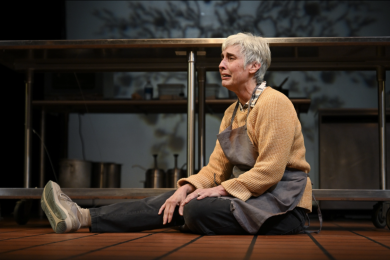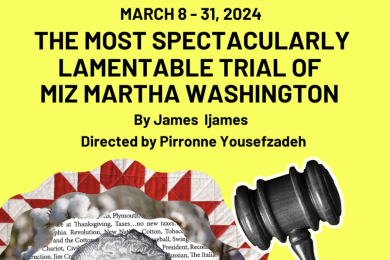Political Fringe Double Header

I wanted to write about Fringe using the angle, “political shows.” That’s a facile premise since, as everyone knows, “all theatre is political.” And all shows do some ideological work (whether they intend to or not). This is true of even the Fringiest of Fringe shows – which this year, by popular consensus, appears to be Hamlet but Hamlet’s a Chicken. Irreverence is political (as is piety). Disrupting stereotypes is political, but so is reinforcing them.
Nothing is “not political,” but what I had in mind was focusing on shows that were “political” in the very narrow sense of having to do with public affairs, systems of government, political parties, “political” history, and so on. I have lately been in the mood for material that is at least somewhat subversive.
As it turned out, the most subversive, the most “political,” and the best, most powerful offering I took in at this year’s Fringe was Gabriel Mata’s beautiful Dreaming, which falls under the classification, dance performance, I suppose. Mata’s previous Fringe show, 2017’s Out of the Shadows, was awarded a Twin Cities Arts Reader Best of the Fringe Award. His new play is comprised of a series of episodes that move Mata in and out of dreaming and waking. Sometimes it is hard to tell whether he is in the one state or the other, though we know that he is awake when early on in the play, there is a loud knock at the door, and the response, “Who is it?” As we learn, for Mata, a simple knock on the door can be portentous.
Mata’s subtle and gorgeous choreography, accompanied by narration, capture both the psychology of dreaming and the deep vulnerability of immigrants living in the United States at this frightening moment. How does it feel to live as a young, handsome, gay Mexican-born dancer -- in this case, one who has lived here for some 20 years and who has found and tutored his art to perfection? How does it feel to be aware of the precariousness of one’s situation as an immigrant in a country in which some people no longer bother to hide their xenophobia? How does it feel knowing that at any moment you could be taken aside by officials and hammered with probing questions, insinuations of criminality, and repeated threats of deportation? Or, as the play asks, how can a person sleep easily knowing that his home and the life he has built could all be taken away by one slip?
I don’t know much about dance, but it has always seemed to me that part of what makes a dance performance truly affecting is the performer’s own love for dancing. In Dreaming, there are moments when you can’t help but thrill in the sheer joy Mata feels, one that is visible in all the sinews of his body as he leaps and lands and strikes his “falling cheerleader” poses. And the empathetic thrill one experiences in watching the dancer revel in the miraculous capacity of his body makes it all the more devastating when he is interrupted by a bang on the door. “Who’s there? Who is that?” Mata’s voice trembles as he struggles to stay calm. Later, as he appears to wake up in a strange cold place he doesn’t know, you are drawn in an almost visceral way into the darkness of our national moment. Mata’s show is profoundly affecting and it is about as political as it gets.
I also saw Far Away, Wayward Theater’s production of a dystopian piece Caryl Churchill wrote in 2000. It was recommended to me as an overtly political show. While Far Away was – quite clearly – political, and while it was superbly directed by Sarah Nargang, I could not really make out what the play was about. When I was in my 20s, I had the good fortune to see the original off-Broadway production of Cloud Nine and I remember being absolutely transported by Churchillian stage magic. Far Away is what one might call a lesser work, and while Churchill’s dialogue is always sizzling and theatrically pleasing, this particular play was so relentlessly metaphorical that it made me want to shout, “enough with the nuance!,” or “more telling, less showing!,” or something like that.
Here is what I was able to pick up: Far Away seems to be about shared complicity and the leveling of individualism and empathy in a dark, futuristic, totalitarian, sacrificial economy, in which obedient factory workers design and manufacture hats [SPOILER ALERT] for the sacrificial victims to wear as they parade to their deaths. The general conformity, expressed in the grey and dull beige workers’ uniforms (the brilliant costume design is by Anna Hill), stands in contrast to the distinctly weird, extravagantly colorful, ribboned, feathered hats the victims are made to wear. Perhaps this means: non-conformity means certain death. Michael Kelley and Hannah Steblay are superb as two hat-makers who manage to find love in the ruins (with shades of Winston and Julia from Orwell’s 1984). They love each other truly, madly, and deeply, and yet their sensibilities, like everyone else’s, are ultimately corroded by the general brutality. There is also, I think, a Shakespearean-ish motif about nature’s having gone awry: rivers flowing in two directions, etc. While it is impossible to come away from this production without being deeply impressed by the talent of the creative team involved –I am sure that I want to see the next Wayward production – I could not help but feel frustrated by the overall vagueness.
For most of us, it has been a nightmarish year of politics in the real world. It is perhaps a small consolation that it has been (for the same reason?) a pretty good year for political theater at the Fringe.
I also enjoyed the hard political discussion with audience participation at Animal, Vegetable, Political and the not-especially-political-but-hysterical (a) Normal Theatre Play by the improv group Goof Goof was terrific. The audience was asked not to give out about the play’s content, which has to do with a very, very famous work by a canonical British writer, so I canMt go into much detail. But the comic talent of Liv Agusta, Phillip Shramm, Jay Kistler and Katie Novak made the show kind of a gas.
So was stopping by Fringe Central at Red Stag last night as this picture clearly show.




